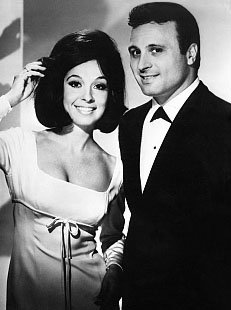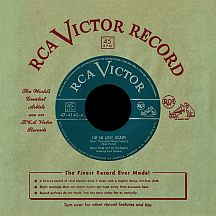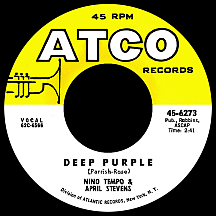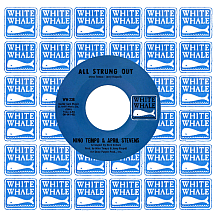NINO TEMPO AND
APRIL STEVENS
Those LoTempio kids from Niagara Falls were a gift to the music world. As their careers progressed, the two traveled separate routes while frequently crossing paths; slyly inspired at their best or curiously interesting on any given day, Carol LoTempio and her brother Antonino reached a personal pinnacle of popularity in late 1963 after quite a few years as performers. "Deep Purple," the song that secured their place in history, was itself a ripe-for-reworking relic, a composition stretching back more than three decades. As Nino Tempo and April Stevens, stage names chosen years earlier, they became chart-topping hitmakers...Grammy award winners...a peerless pop culture pair.
Brother "Nino" had a sharp rhythmic sense from the get-go; he's often recounted a story of attending a Benny Goodman concert in Buffalo, New York with his parents where, at his mother's urging, the seven-year-old approached Goodman claiming he had the talent to be a singer in the band, after which the famous clarinetist called his bluff and the kid wowed the crowd. After that he took up the clarinet in imitation of his newfound hero, adding saxophone, drums and other instruments during his high school years. In the mid-1940s the family moved to Los Angeles and Nino did some acting, scoring small parts in films like the top-notch 1945 war drama G.I. Joe, 1949's The Red Pony (written for the screen by John Steinbeck) and Johnny Trouble, a romance drama from 1957.
In 1950, Carol was approached by record producer Tony Sepe of Laurel Music while browsing the record racks at Wallichs Music City in Hollywood. Taken with her good looks, Sepe convinced her to make a record. "No! No! No! Not That!," penned by Hal David and Don Rodney, concerned a frisky male suitor and she delivered the vocal in a playful way that came quite naturally. Embarrassed by the result, she chose an alias, April Stevens, over her first choice, Carol Tempo, and breathed a sigh of relief when the single, on the small Castle label, went nowhere. One release on Society ("Don't Do It") was also unsuccessful, but the die had been cast. Henri René, a bandleader of German descent under contract to RCA Victor Records, hired her based on the kittenish vocals he'd heard on those early efforts. April's delivery on a remake of "I'm in Love Again," a Cole Porter song originally featured in the 1920s Broadway musical The Greenwich Village Follies, was only sightly provocative...just enough to make it a top ten hit in the summer of 1951.
Two more singles with René's orchestra made their marks before 1951 came to a close. "Gimme a Little Kiss, Will Ya Huh?" (originally a hit for "Whispering Baritone" Jack Smith in 1926) reached the top 30 in August, followed by "And So to Sleep Again" two months later (Patti Page had the bigger version). April would have to wait several years for another strong seller, during which time she recorded for Cincinnati's King Records in 1953 and '54 and sang "If I Can't Have You" in the 1955 crime film The Big Tip Off. During the late '50s, Nino became a regular sax player for trumpeter Maynard Ferguson's jazz band. His rock and roll recording of "Loonie 'Bout Junie" (backed by Henry Mancini's orchestra) was featured in the Peter Gunn TV series starring Craig Stevens; Nino's singing and sax work gained screen time in the detective drama's December 1958 episode Sisters of the Friendless.
April signed with Imperial Records and gave the "sex kitten" approach a try, literally, with "Teach Me Tiger," complete with a softly-but-convincingly flirty 'Wo-wo-wo-wo-wo...' that raised the ire of puritainly protesters; it logged time on the national charts in the final weeks of 1959 and has a following that's grown throughout the years. Nino made more singles for RCA: "Ding-A-Ling" failed to click as a teen offering and was followed by a spoken-and-sung tie-in to the 1960 big screen thriller "Jack the Ripper," setting lyrics to the film's instrumental theme by Pete Rugolo. Moving to United Artists, Nino's "Lipstick on Your Lips" suggested the teen thing was not his calling, but that didn't stop him from giving it another go in a new sister-and-brother configuration.
Teaming for the first time as April Stevens and Nino Tempo, the siblings recorded "High School Sweetheart" for UA with producer Don Costa, which borrowed heavily from Costa's arrangement of George Hamilton IV's '57 hit "Why Don't They Understand." When that one faltered, they delivered a bouncy, patriotic song about John F. Kennedy, timing the release to his January 1961 inauguration; April's vocal foreshadowed Marilyn Monroe's live performance of "Happy Birthday, Mr. President" 16 months later. The Capitol Records single was issued under their real names (or nearly so in Nino's case), Carol and Anthony. Next came "Love Kitten," April's purring domestic variation on "Teach Me Tiger"...fun, but it was probably one cat track too many.
By 1962, Nino could frequently be found swinging his sax on session work for Atlantic Records and other companies including Phil Spector's gung-ho Philles operation in Los Angeles. When Atlantic bossman Ahmet Ertegun found out about the sister-brother act, he signed them and suggested they try updating some standards of the '20s and '30s. "Sweet and Lovely," a song dating to 1931 (Gus Arnheim and his Cocoanut Grove Orchestra took their original version to number one and Guy Lombardo had a major hit with it as well), came together nicely with April, Nino and backing girl group The Blossoms; issued on Atco, it went top ten in L.A. that summer and did well throughout Southern California, but didn't catch on in many other markets and made a weak showing on the national charts. Another 1931 chestnut, "Paradise" (number one hits for both Gus and Guy mentioned above), had a similar uptempo feel but likewise fared poorly outside SoCal.

A third Atco disc, "Baby Weemus," went in a different direction. Penned by the singing duo, its rock and roll arrangement featured a babylike vocal by April that gave it a novelty flavor, but the single failed to make a dent. During an earlier session they had done an impromptu recording of "Deep Purple," a Mitchell Parrish-Peter DeRose tune that had been a chart-topper in 1939 for Larry Clinton's orchestra with singer Bea Wain and was also a hit for Jimmy Dorsey and his vocalist Bob Eberly the same year, then was successfully revived in 1957 by Billy Ward and his Dominoes with lead singer Eugene Mumford. Could April and Nino's quickie pop version with Nino's slipshod harmonica playing and April feeding him the lyrics midway through (he hadn't made time to learn them all) become a hit? Ahmet Ertegun didn't think so!
They made a deal: put out the single and if it didn't click, Ahmet would tear up their contract (Nino wanted to make records with Spector anyway). The flip, a catchy tune by Tempo with one of the longest titles ever ("I've Been Carrying a Torch for You So Long That I Burned a Great Big Hole in My Heart"), was the side Ertegun was betting on to make it...if anything happened at all. Well, he was wrong (but, as it turned out, enjoyed telling the story of his misjudgment for many years afterward). "Deep Purple," with a reverse credit to Nino Tempo and April Stevens, was one of those fortunate accidents thrown together in the final minutes of a long night of recording; it hit number one in November 1963.
And so the procedure of modernizing relatively distant standards continued. "Whispering," Paul Whiteman's monolith among the recordings of 1920, was given a whistling treatment and landed one notch beneath the top ten in the early weeks of 1964, right around the time Tempo and Stevens became Grammy recipients for "Deep Purple" in the category Best Rock and Roll Recording, despite the song's borderline-rock arrangement. They took on "Stardust," the Hoagy Carmichael-Mitchell Parish classic from '27 (an instrumental chart leader for Isham Jones in '31, it had more recently been popular through versions by Nat "King" Cole, Ward's Dominoes and Frank Sinatra), and reached the top 40 in March '64. Successive oldies (major hits like "I'm Confessin'" from the '30s and "Tea For Two" from the '20s) fared poorly as the tactic had ostensibly run its course.
Solo efforts kept coming from April (usually included on the duo's Atco albums); in '65 she joined Charlie Rich on the teen dance show Shivaree for a medley of his hit "Mohair Sam," followed by her put-down answer version, "No Hair Sam." Though N&A never got around to making their own records with Spector after leaving Atlantic, the duo aped Phil's "Wall of Sound" (Righteous Brothers style) with "All Strung Out" (penned by Tempo and Jerry Riopell), a top 30 hit on White Whale in the fall of '66. Other memorable not-quite-hits include "My Old Flame" (another 1930s reworking) and "I Can't Go on Living Baby Without You," a Tempo-Riopell goodie that hit the charts in July 1967, nearly a year after it debuted on the B side of "Strung."
For years, Nino was a regular fixture at recording sessions while occasionally releasing his own works; "Sister James," an instrumental he wrote with longtime Spector cohort Jeff Barry (with a few lyrics added), was a funk-fused hit for Nino Tempo and 5th Ave. Sax in 1973. April Stevens made the charts in '74 with yet another sensuously-sung (and mildly controversial) single, the Barry-Stevens-Tempo tune "Wake Up and Love Me," credited to her first name only. In fact, dropping the surnames was how the sibling duo rolled during the '70s, with mildly popular songs on A&M like a vocal take on The Crusaders' "Put it Where You Want It" as Nino and April. We can refer to them using several appellative variations; for years I've been enjoying how creatively unique their many recordings, whether made separately or together, really are.
NOTABLE SINGLES:
- No! No! No! Not That! - 1950
by April Stevens - Don't Do It - 1951
by April Stevens - I'm in Love Again - 1951
by Henri René and his Orchestra featuring April Stevens - Gimme a Little Kiss, Will Ya Huh? - 1951
by April Stevens with Henri René and his Orchestra - And So to Sleep Again - 1951
by April Stevens with Henri René's Orchestra and Chorus - Treat Me Nice - 1953
by April Stevens - Loonie 'Bout Junie - 1958
by Nino Tempo - Teach Me Tiger - 1959
by April Stevens - Ding-A-Ling - 1959
by Nino Tempo - Jack the Ripper - 1960
by Nino Tempo with Pete Rugolo and his Orchestra - Lipstick on Your Lips - 1960
by Nino Tempo - High School Sweetheart - 1960
as April Stevens and Nino Tempo - Big John - 1961
as Carol and Anthony - Love Kitten - 1961
by April Stevens - Sweet and Lovely - 1962
as April Stevens and Nino Tempo - Paradise - 1963
as April Stevens and Nino Tempo / - Indian Love Call - 1963
as April Stevens and Nino Tempo - Baby Weemus - 1963
as April Stevens and Nino Tempo - Deep Purple /
I've Been Carrying a Torch for You So Long That I
Burned a Great Big Hole in My Heart - 1963 - Whispering - 1964
- How Could Red Riding Hood (Be So Very Good) - 1964
by April Stevens - Stardust - 1964
- I'm Confessin' (That I Love You) /
Tea For Two - 1964 - Ooh La La - 1964
- Swing Me - 1965
- No Hair Sam - 1965
by April Stevens - All Strung Out - 1966
- My Old Flame - 1967
- Boys Town (Where My Broken Hearted Buddies Go) - 1967
by Nino Tempo - I Can't Go on Living Baby Without You - 1967
- Falling in Love Again - 1967
by April Stevens - Yesterday I Heard the Rain (Esta Tarde Vi Llover) - 1969
- Love Story - 1972
- Put it Where You Want It - 1973
as Nino and April - Sister James - 1973
by Nino Tempo and 5th Ave. Sax - Wake Up and Love Me - 1974
by April - You Turn Me On - 1975
as Nino and April




